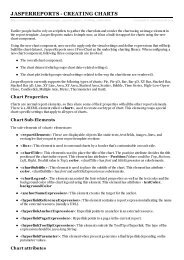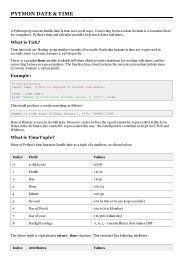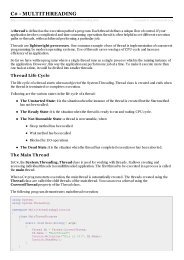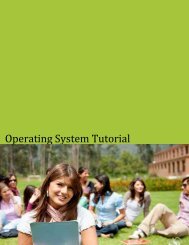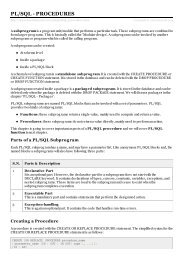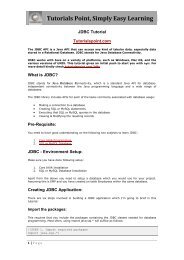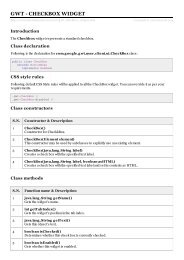Pascal Sets - Tutorials Point
Pascal Sets - Tutorials Point
Pascal Sets - Tutorials Point
Create successful ePaper yourself
Turn your PDF publications into a flip-book with our unique Google optimized e-Paper software.
PASCAL - SETS<br />
http://www.tuto rialspo int.co m/pascal/pascal_sets.htm<br />
Copyrig ht © tutorialspoint.com<br />
A set is a collection of elements of same type. <strong>Pascal</strong> allows defining the set data type. The elements in a set are<br />
called its members. In mathematics, sets are represented by enclosing the members within braces{}. However,<br />
in <strong>Pascal</strong>, set elements are enclosed within square brackets [], which are referred as set constructor.<br />
Defining Set Types and Variables<br />
<strong>Pascal</strong> Set types are defined as<br />
type<br />
set-identifier = set of base type;<br />
Variables of set type are defined as<br />
var<br />
s1, s2, ...: set-identifier;<br />
or,<br />
s1, s2...: set of base type;<br />
Examples of some valid set type declaration are:<br />
type<br />
Days = (mon, tue, wed, thu, fri, sat, sun);<br />
Letters = set of char;<br />
DaySet = set of days;<br />
Alphabets = set of 'A' .. 'Z';<br />
studentAge = set of 13..20;<br />
Set Operators<br />
You can perform the following set operations on <strong>Pascal</strong> sets.<br />
Operations<br />
Union<br />
Difference<br />
Intersection<br />
Inclusion<br />
Symmetric difference<br />
In<br />
Descriptions<br />
This joins two sets and g ives a new set with members from both sets.<br />
Gets the difference of two sets and g ives a new set with elements not common to<br />
either set.<br />
Gets the intersection of two sets and g ives a new set with elements common to<br />
both sets.<br />
A set P is included in set Q, if all items in P are also in Q but not vice versa.<br />
Gets the symmetric difference of two sets and g ives a set of elements, which are<br />
in either of the sets and not in their intersection.<br />
It checks membership.<br />
Following table shows all the set operators supported by Free <strong>Pascal</strong>. Assume that S1 and S2 are two character<br />
sets, such that:<br />
S1 := ['a', 'b', 'c'];<br />
S2 := ['c', 'd', 'e'];
Operator Description Example<br />
+ Union of two sets S1 + S2 will g ive a set<br />
['a', 'b', 'c', 'd', 'e']<br />
- Difference of two sets S1 - S2 will g ive a set<br />
['a', 'b']<br />
* Intersection of two sets S1 * S2 will g ive a set<br />
['c']<br />
>< Symmetric difference of two sets S1 >< S2 will g ive a set ['a', 'b',<br />
'd', 'e']<br />
= Checks equality of two sets S1 = S2 will g ive the boolean<br />
value False<br />
Checks non-equality of two sets S1 S2 will g ive the boolean<br />
value True<br />
displayColors(c);<br />
c:=[red, blue]+[yellow, green];<br />
displayColors(c);<br />
c:=[red, blue, yellow, green, white, black, orange] - [green, white];<br />
displayColors(c);<br />
c:= [red, blue, yellow, green, white, black, orange]*[green, white];<br />
displayColors(c);<br />
c:= [red, blue, yellow, green]>



